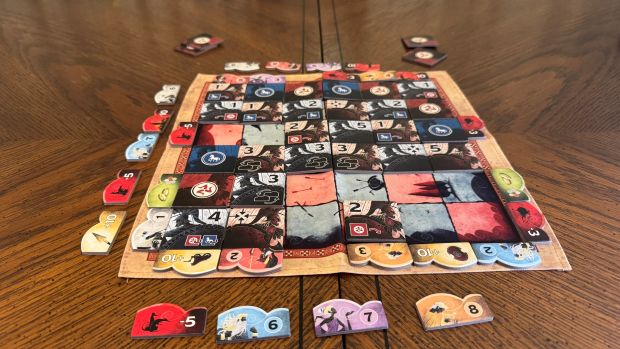Reiner Knizia’s Iliad is a two-player tile-laying game that reimagines the Trojan War as a tactical duel between Achilles and Hector. Players alternate placing warriors, each with an assigned value and ability, to control rows and columns. When a row or column is filled, the player with the majority strength selects one of the two end tiles, while the opponent takes the other. Victory is achieved by collecting favor tiles from all five gods; if both players succeed or fail in this, the winner is determined by the sum of their highest-value tiles from each god.

One thing that really stood out to me about Iliad was its pacing. The first player will have exactly eight options on their first turn: either of their two tiles in four locations. As more tiles get placed, the decision space will likewise grow—that is, until the constrained 6x6 grid starts to fill. In the endgame, the choices diminish to nearly nothing. This rise and fall of flexibility gives a nice arc to each game.
The game also has an interesting balance between short-term and long-term decisions. With such a small hand—only two tiles—it is impossible to plan too far ahead. Once you start laying out your tiles, trying to balance favor of the gods and total score, there is a pivotal moment where you need to decide between maximizing your points or trying to steal the favor of the gods from your opponent. And of course, your opponent is doing exactly the same to you.

The variable setup of the success tokens is a bit of a double-edged sword. They ensure that each game has its own flavor and story—but this also makes some setups less interesting. If a lot of similarly valued tokens are placed opposite of each other, it diminishes the interest in that lane. Luckily, since the tokens are dynamic in value through each game, it’s never completely boring... but some setups are certainly more engaging than others.
The random draw of tiles is similarly a blessing and a curse. It adds interesting and tense decisions at times. But sometimes, it just feels unfair. Each tile’s special ability shines at certain times of the game. Being able to move your opponent’s tile shines in the mid-game, as the rows and columns start to fill. Being able to swap out your award tiles from the reserve is only useful once you have a reserve tile. It can be frustrating to pull tile after tile that you don’t really need, while your opponent is able to swap out their -10 tile as soon as they get it.
If you are looking for a tense push-and-pull two-player game with tough choices throughout, Iliad would be a great addition to your collection. The randomness may feel unfair at times, but it's also what makes this game such a tactical joy to play.
A copy of Iliad was provided by Bitewing Games for review purposes. Opinions are my own.
- Previous: Ichor Review